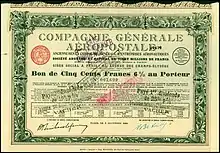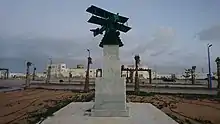Aéropostale (aviation)
Aéropostale (formally, Compagnie générale aéropostale) was a pioneering aviation company which operated from 1918 to 1933. It was founded in 1918 in Toulouse, France, as Société des lignes Latécoère, also known as Lignes aeriennes Latécoère or simply "The Line" (La ligne).
| |||||||
| Founded | 1918, France | ||||||
|---|---|---|---|---|---|---|---|
| Commenced operations | 1918, France | ||||||
| Ceased operations | October 7, 1933 | ||||||
| Operating bases | Toulouse-Montaudran Airport (Toulouse – Lasbordes Airport) Toulouse, France | ||||||
| Destinations | Barcelona, Dakar, Casablanca | ||||||
| Headquarters | Toulouse, France | ||||||
| Key people | Pierre-Georges Latécoère | ||||||
.jpg.webp)

History

Aéropostale founder Pierre-Georges Latécoère envisioned an air route connecting France to the French colonies in Africa and South America. The company's activities were to specialise in, but were by no means restricted to, airborne postal services.
Between 1921 and 1927 the "Line" operated as Compagnie générale d'entreprises aéronautiques (CGEA). In April 1927 Latécoère, having troubles with its planes, damaged due to long flights to South America, decided to sell 93% of his business to another Brazilian-based French businessman named Marcel Bouilloux-Lafont. On that basis Bouilloux-Lafont then founded the Compagnie générale aéropostale, better known by the shorter name Aéropostale.
On December 25, 1918, the company began serving its first route between Toulouse and Barcelona in Spain. In February 1919 the line was extended to Casablanca. By 1925 it extended to Dakar, where the mail was shipped by steamer to South America. In November 1927 regular flights between Rio de Janeiro and Natal were started.[1] Expansion then continued to Paraguay and in July 1929 a regularly scheduled route across the Andes Mountains to Santiago, Chile, was started, later extending down to Tierra del Fuego on the southern part of Chile. Finally, on May 12–13, 1930, the trip across the South Atlantic by air finally took place: a Latécoère 28 mail plane fitted with floats and a 650 horsepower (480 kW) Hispano-Suiza engine made the first nonstop flight. Aeropostale pilot Jean Mermoz flew 3,058 kilometres (1,900 mi) from Dakar to Natal in 19 hours, 35 minutes, with his plane holding 122 kilograms (269 lb) of mail.
The company was dissolved in 1932 and merged with a number of other aviation companies (Air Orient, Société Générale de Transport Aérien, Air Union, and Compagnie Internationale de Navigation) to create Air France.
Aéropostale pilots
Source:[2]
Developed in the aftermath of World War I, air mail service owed much to the bravery of its earliest pilots. During the 1920s, every flight was a dangerous adventure, and sometimes fatal. The period was eloquently described by the French writer Antoine de Saint-Exupéry – himself an Aéropostale pilot – in his novel Vol de Nuit ("Night Flight"), in which he describes a postal flight through the skies of South America.
Aéropostale's roster of pilots included such aviation legends as:
- Jean Mermoz
- Antoine de Saint-Exupéry
- Henri Guillaumet
- Marcel Reine
- Emile Lécrivain
- Pierre Deley
- Henri Larrieu (1893 – 1974)
- Raymond Vanier
Aircraft
Among the aircraft operated by the company were:
- Blériot 5190
- One hundred Breguet 14s
- Farman F.70, for passenger and mail routes between Casablanca and Dakar and also from Algiers to Biskra.
- Latécoère 26
- Latécoère 28
- Latécoère 300
- Couzinet 71 III Arc en ciel
Film
- Night Flight (1933 film), a 1933 film starring Clark Gable, was based on the novel by Antoine de Saint Exupéry, which recounted his real life experiences when he managed and flew for the Aeroposta Argentina subsidiary in South America.[3] In the movie the airline was given the fictitious name Trans-Andean European Air Mail.
- In 1995, Futuroscope paid homage to Aéropostale pilot Henri Guillaumet with a 3D IMAX film by Jean-Jacques Annaud, in Wings of Courage (les Ailes du Courage), chronicling the pilot's crash on the frozen lake surface of Laguna del Diamante in the Andes, while flying mail for the South American subsidiary, Aeroposta Argentina.[4] Guillaumet was portrayed by Craig Sheffer, Antoine de Saint-Exupéry by Tom Hulce, and Jean Mermoz played by Val Kilmer.
See also
- Aéropostale, a U.S. apparel outlet that took its name and some of its design cues from the Compagnie générale aéropostale.
- Aeropostal Alas de Venezuela, normally referred to as just Aeropostal, an airline in Venezuela, established after the government took over air routes previously operated by the French Aéropostale
- Aeroposta Argentina, a subsidiary in Argentina.
References
- Citations
- Franix-Reichel. Une victoire de l'aviation française, Paris: Le Figaro, 17 June 1928, p. 5. Retrieved from the Gallica.bnf.fr website.
- Ros, Miquel (2021-04-14). "Aeropostale: The hero pilots who connected the world by airmail". CNN. Retrieved 2023-05-02.
- Hanson & Gevinson 1993, Vol. 3.
- James, Caryn. Wings of Courage: High Over the Andes, In Enormous Goggles (1995 Film Review), The New York Times, 21 April 1995. Retrieved: 28 September 2012.
- Bibliography
- Mary, Jack. "Aéropostale, les autres lignes: Algérie, Paraguay, Patagonie, Bolivie, Venezuela", 2012, ISBN 978-2-7089-9238-2
- Binder, Yves Marc & Sophie. "Aéropostale, les carnets de vol de Léopold", 2009, ISBN 978-2-7089-9222-1
- de Bure, Guillemette. "Les secrets de l’Aéropostale: Les années Bouilloux-Lafont 1926-1944", 2007, ISBN 2708992104
- Daurat, Didier. "Dans le vent des hélices, témoignage du mythique directeur de la Ligne", passé à la postérité sous le nom de Rivière dans les pages de Vol de nuit
- Fleury, Jean-Gérard. "La Ligne", ouvrage de référence sur l'Aéropostale rédigé par un journaliste passionné d'aviation et collaborateur de l'industriel René Couzinet
- Hanson, Patricia King (Executive Editor) and Alan Gevinson (Associate Editor). The American Film Institute Catalog of Motion Pictures Produced in the United States: 1931-40, Feature Films. Berkeley, California: University of California Press, 1993. ISBN 978-0-52007-908-3.
- Mermoz, Jean Mes Vols (Flammarion, 1937), regroupement posthume de textes du pilote et d'hommages de ses collègues, amis et admirateurs
- Poivre d'Arvor, Patrick et Olivier. "Courriers de nuit", Place des Victoires, 2003, Mengès, 2004 ; LGF Le Livre de Poche, 2006 (version texte seulement)